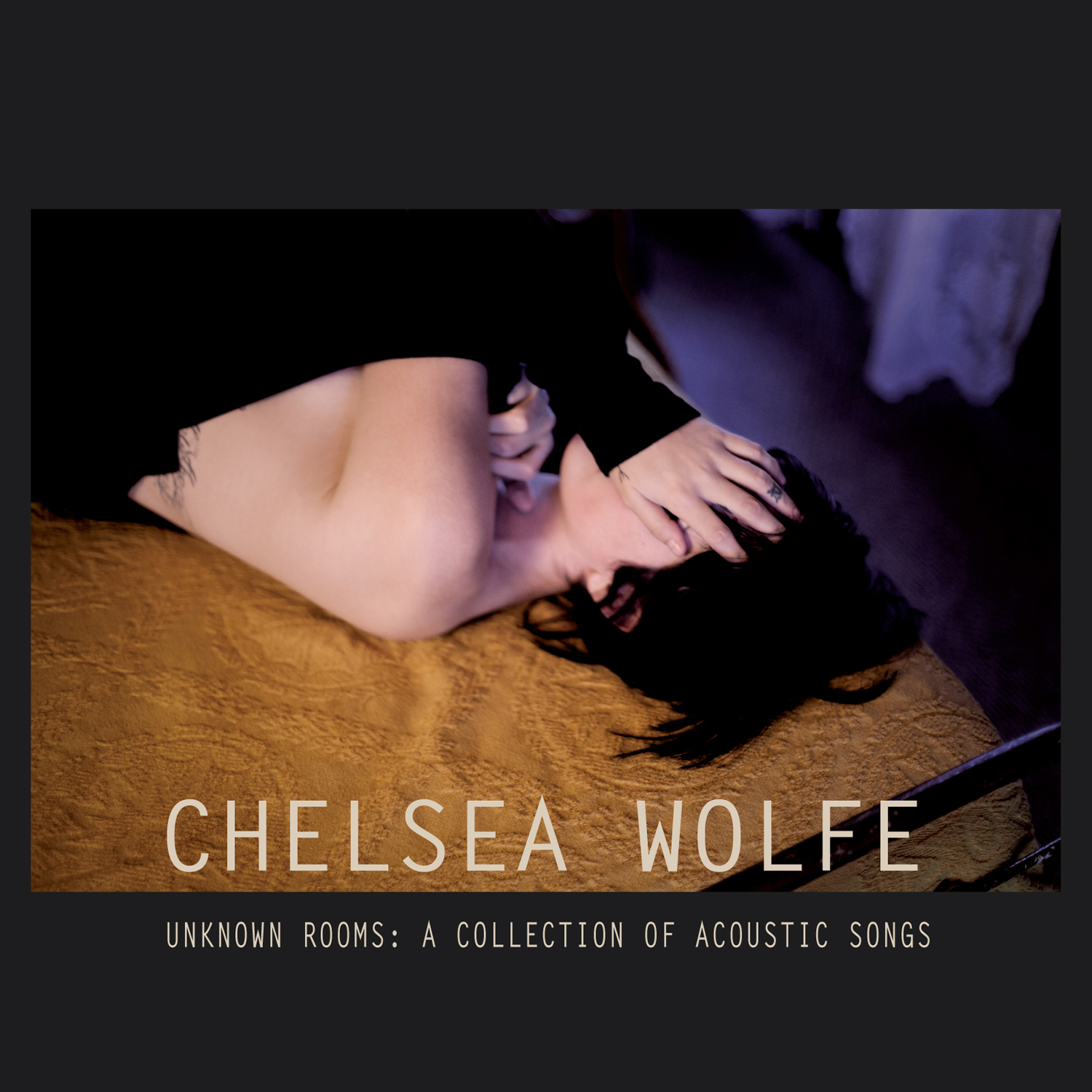The muddied end-of-days obsession that was a hallmark of Chelsea Wolfe’s 2010 debut Apokalypsis seems, in forethought, to have been merely the shaking out of cobwebs and sedentary grime from some hollowed out grotto. The stripped down songs on her newest album Unknown Rooms: A Collection of Acoustic Songs feel even more intimate and cautionary, as Wolfe further denudes her songs from their lo-fi goth presentation. And while the title is somewhat deceptive, as these songs do have more accompaniment than just an acoustic guitar–though just barely in some cases–they do feel warmer and more inviting than those on her debut. Like a brief respite during a storm, Unknown Rooms feels poised on the cusp of action, though what that might be is never revealed. There is a sense of anticipation and an almost palpable sense of forewarning that envelops these tracks. The fact this collection, at only nine tracks, is fairly short only heightens the sense of time running out and suggests that Wolfe may be able to sense something on the horizon that we can’t see just yet.
The album deals in brushed drums, subtle bass, and Wolfe’s mellifluous voice, supported by a delicately picked and strummed acoustic guitar. There’s nothing revolutionary in her approach to the material but the austerity and bare-bones mandate that these songs demand make for an interesting if somewhat same-y listening experience. There’s nothing wrong with trimming away the fat but the core of the song—that beating heart—has to be strong enough to support this stripped down frame. On Unknown Rooms, Wolfe manages to keep the songs afloat by sheer force of will and an audacious drive to reclaim these song’s ancestors.
She understands the limitations of the sounds with which she’s working but also manages to capitalize on our experience with those same sounds to trigger the innate pleasure points in our brains connected to musical familiarity. It also doesn’t hurt that this album harkens back to the death ballads and disaster songs that were a staple of early folk recordings. Those recordings felt more personal and candid than some of the blues-based folk songs—just listen to some songs by The Blue Sky Boys or Leadbelly. It doesn’t take long before you get into the really dark stuff. And it seems that Wolfe is all too aware of this music’s storied lineage.
The album opens onto the broad expanse of “Flatlands,” where Wolfe’s voice seems to be carried along on a frail wind, with her acoustic guitar and the restrained drums and understated bass conducting the song through some indeterminable openness. The somber violin that eventually joins the mix provides a compelling counterpoint to her vocals and reinforces the sense of loss and regret that seems to inhabit the track. Unrelenting she sings, “I want flatlands/when it’s said in the dark and you know it’s always there/when it’s dead in our heart but your mind is unafraid.” Visions of barren wastelands and broken towns litter her subconscious and spill out for us to hear and imagine. “The Way We Used To” exploits Wolfe’s eerily affecting vocalization to great effect, as it builds around stark toms and understated strings until her voice hits a higher register, and she sings as though the air is being pulled from her lungs. She takes a more traditionalist approach with “Appalachia,” a song that rings out with the authenticity of its lineage—all hammered guitar notes, wispy vocals, and lonesome wayfaring strings. “I Died With You” is no more than a quick exhalation, with only Wolfe’s hauntingly multi-tracked vocals to carry it. The slightly detuned guitar on “Boyfriend” stands out in brash contrast to its soaring, gently echoing vocals.
One of the drawbacks though of having such a terse set of songs is that any glaring mistake can set the album dramatically off course. And while there are some issues with the feeling of déjà vu, Unknown Rooms doesn’t really do anything noticeably off the mark. That’s not to say that it’s a perfect record, but you can hardly fault Wolfe for sticking so close to established musical guidelines when she is so clearly smitten with the sounds that she’s creating. As much as she tried to make the glaringly lo-fi goth-siren production of Apokalypsis work in her favor, the drawn back arrangements here serve her much more faithfully in trying to convey a lingering sense of dread and regret. Album closer “Sunstorm,” with its harrowing tale of desperation and suicide played out against hammering piano chords, marks one of the most psychologically compelling and disquieting points on an album chock full of them. Her repeated refrain of “I remember everything you said” becomes a kind of mantra that she clings to in this swirling eddy of emotional and apparent sense of physical vulnerability—as if these words could save her and those around her.
There’s no indication one way or another if Wolfe plans on continuing her exploration of this kind of twisted rural expressionism. As much as can be read into the album’s subtitle (A Collection of Acoustic Songs), it’s possible that she wanted to have her fans see this as merely a one-off and that those eager for her kind of densely packed, self-styled “doom folk” need only wait for her next album to have their fill. If she takes anything away from her success on this record however, I hope that it’s the idea that sometimes the simplest things can resonant the most deeply with the listener. She doesn’t need to constantly bombard us from all sides with her apocalyptic warnings and scenes of domestic suffering for us to take notice. She just needs to take our hand and point us in the right direction.

